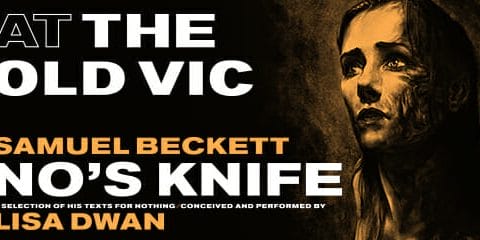 One of my favourite things about doing this job, is seeing pieces of theatre that have never seen before. Usually they are by un-known playwrights, just starting out on a, hopefully, promising career. This is the first time, however, I’ve seen a first production by someone like Samuel Beckett.
One of my favourite things about doing this job, is seeing pieces of theatre that have never seen before. Usually they are by un-known playwrights, just starting out on a, hopefully, promising career. This is the first time, however, I’ve seen a first production by someone like Samuel Beckett.
Admittedly, the reason this is the first production of ‘No’s Knife’ is because it was never written as a theatrical piece, but instead, a selection of thirteen fragmented prose called ‘Texts for Nothing’. Beckett himself described these as an “afterbirth” to his three great novels. Lisa Dwan, encouraged by the notoriously strict Beckett estate, has selected five of these fragments to transpose to the stage.
Lisa Dwan has established herself as the foremost exponent of Beckett’s work having performed around the world in the Beckett Trilogy (Not I, Footfalls and Rockaby), managing to deliver ‘Not I’ at the speed of thought, around 9 minutes, as per Becketts instructions, compared to the spoken 30 minutes reading.
These five selected fragments seem to revolve around a desolate space between life and death, although the prose is convoluted and difficult to follow, it is clear this is very much an introspective thought process.No longer constricted by prescriptive stage directions, for ‘No’s Knife’ Lisa Dwan and her team have been able to experiment. It begins with an extreme close up of an eyelid projected to a white sheet, the eye opens and we travel through the pupil to the sound of struggled breathing, the eye reveals Dwan swimming or drowning, possibly being born, possibly dying.
At first Dwan is embedded in a rock face, then she is in a barren land. Next she hangs in a cage before walking right to the front of the stage, bathed in harsh white light, with the proscenium arch seeming to glow behind her. It’s effective staging – adding to, or perhaps distracting from, the text.
Lisa Dwan herself performs vocal acrobatics throughout the 75 minute performance, for which she is completely alone. From sweet Irish lilt to near demonic terror demonstrating the internal dialogue. Dwan should be applauded for this feat of performance. Equally, Mic Pool, should be admired for the sound effects that make a lone voice on stage sound like a small choir.
Is ‘No’s Knife’ something everyone will enjoy? Probably not. Will it appeal to those who have followed Beckett’s work or enjoy more absurdist theatre? I expect so. Is it a triumph in terms of performance from Lisa Dwan? Absolutely.

















